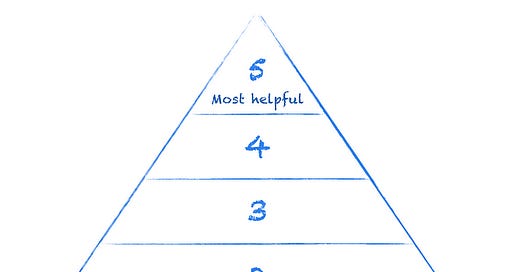1. Put in the reps
“Be so good they can’t ignore you.” - Steve Martin
Let’s just be clear: hard work is a basic requirement if you want to get ahead. If you want to prove yourself in a job, or build an impressive career trajectory, you will need to be more focused, more disciplined, and more importantly consistently good. I always tell people that consistently good is better than occasionally great, and just like in sports to be consistently good (and get better over time) you need a lot of practice and hard work.
I don’t subscribe to the ideology of hustle culture, working 100 hours a week, and all that non-sense. I believe in putting in the reps, and working hard, and yes sometimes this means you will have to work evenings or weekends, especially earlier on in your career, but I don’t think this is something you have to be doing all the time to be successful.
2. Be most helpful
Or in other words: jump on the biggest grenades you can find. One thing that has worked consistently well for me whenever I start a new role, is to do the workplace equivalent of punching the biggest guy you can find on your first day in prison: I find the hardest problem that everyone is afraid of touching, and I volunteer to solve it.
The diagram above is Daniel Debow’s Helpful Hierarchy:
Level 1: is when you tell someone there’s a problem, i.e. not very helpful.
Level 2: is when you tell someone you’ve found a problem, and some causes.
Level 3: is when you identify the problem, some causes, and offers a few potential solutions.
Level 4: is when you identify the problems, causes, and a few solutions, then make a recommendation on which solution to pursue.
Level 5: is when you go to your manager saying you identified a problem and its causes, determined how to fix it, and fixed it.
Get on that level 5 train as early as you can in your career, stay on, and you’re guaranteed to go very far.
3. Share your ambitions & ask for opportunities
This one is pretty simple and straight forward: Share your ambitions with people around you, especially your managers. If you want to become CEO one day, let everyone know you want to become a CEO. By being vocal about what you want, it helps you achieve a few things:
You make it real for yourself. Instead of this dream being only in your head as a pipe dream, it is now shared with others as the reality of what you’re trying to achieve. You have started day 1 on the path to getting to that dream.
When opportunities present themselves that could bring you closer to your goals, you’ll be the first person to come to mind for consideration. Many people get overlooked for opportunities simply because people don’t know that they’re interested.
But it is not enough to wait for others to identify opportunities for you. You need to ask for opportunities as well:
Ask for opportunities to practice or learn new skills, or to acquire new experiences. For example if you’ve never hired anyone before and you want to acquire that experience, ask to be included in the hiring team.
Identify bigger challenges and ask to take them on, even if they don’t necessarily fit into a specific role or promotion. See level 5 in the helpful hierarchy above.
Ask for promotions: If the bigger challenge you’re looking for translates to a bigger role, then take a risk and ask for that promotion even if you don’t feel 100% ready yet. Most people are figuring things out as they go, and it is okay if you do it too.
4. Take every promotion you are offered
Finally, my last piece of advice is targeted at a very particularly scenario that I have seen many times, especially when the person involved is a woman or a person from a marginalized group (i.e. people who have to deal with much bigger problems of imposter syndrome due to the average workplace hostility towards them):
Let’s say the person works as a software engineer and is doing a great job, and their manager comes to offer them the opportunity to be promoted to team lead / manager. What happens a lot of times is the person doesn’t feel ready, and passes on the opportunity with excuses like “I still feel I need to do more to prove myself first as an engineer before taking the promotion”.
The reasons why I say always say yes to a promotion are:
First of all, unlike what you might think, you can always get your old job back. No manager in the world would choose losing someone who has been a high performing individual contributor over giving them their old job, unless they are complete morons and in this case you’re better off finding another job anyway.
You will most likely do much better than you give yourself credit for, but the most important thing you will never know until you try.
Every promotion, regardless of how good or bad it goes, comes with “career capital”. Career capital refers to the abilities and resources you accumulate – whether skills, credentials, connections, or savings – that allow you to do more with your career in the future. It is like being at the casino, collecting chips, that you can cash in at a later stage in your career, but unlike the casino even if you fail you still win some chips.
I hope you found this helpful and I wish you the best on your journey. If you have any feedback or questions, you can find me on Twitter/X: https://twitter.com/_mohannadali




Thanks for sharing, very helpful